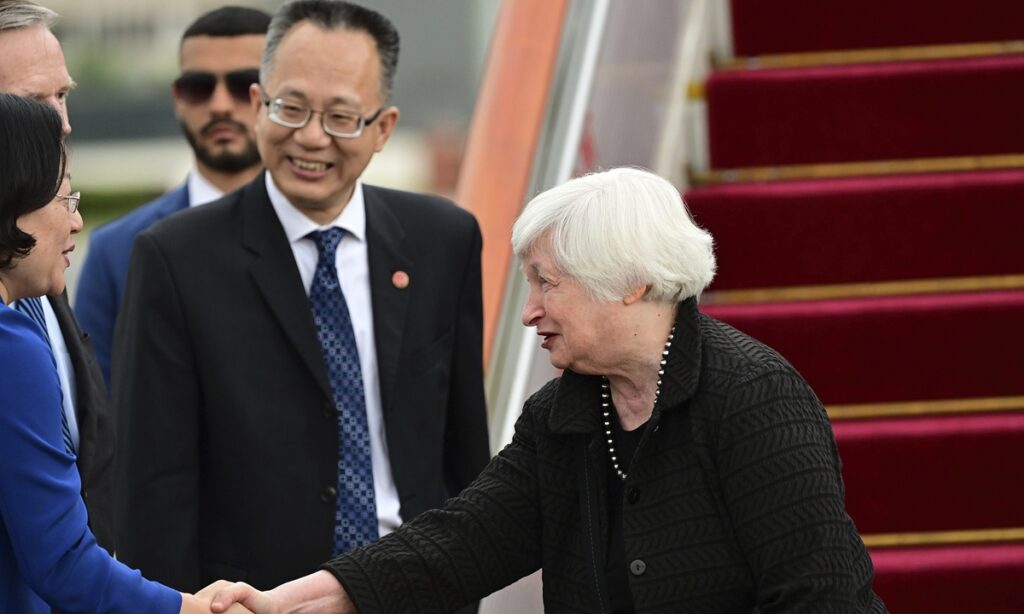China’s Ministry of Finance on Friday expressed hope that China and the US could improve their economic and trade relationship, stressing that there will be no winners in a trade war or “decoupling,” as US Treasury Secretary Janet Yellen kicked off her high-stakes visit to China.
Chinese experts said the ministry’s statement reflects China’s consistent position on China-US ties, and the Chinese side hopes that the two sides could reach constructive outcomes and the US could correct its wrongdoings in order to return the bilateral relationship back to a normal track defined by mutual trust.
Yellen’s visit to China is an implementation of the important consensus reached by the leaders of both countries in Bali and a specific measure for strengthening bilateral communication in fiscal and financial sectors, the Chinese Finance Ministry said on Friday morning.
The nature of the China-US economic and trade relationship is mutually beneficial and win-win. There will be no winners in a trade war or “decoupling.” We hope that the US side can create a sound environment for the healthy development of China-US economic and trade relationship and promote win-win cooperation through concrete actions, according to a statement on the government agency’s website.
“The statement reflects that the Chinese side hopes to not only manage differences between the two countries but also to improve bilateral relations,” Li Yong, a senior research fellow at the China Association of International Trade, told the Global Times on Friday.
This is also a response to the US’ one-sided principles that poison US economic and trade relationship with China as well as the US’ two-faced foreign policy toward China, Li said, referring to Yellen’s speech in April that stressed the US’ so-called national security as well as the US’ mounting crackdown on China’s chip sector.
“It’s China’s consistent position that China and the US have widespread mutual interests in economic development and the two sides should boost cooperation,” Zhou Mi, deputy director of the Institute of American and Oceania Studies of the Chinese Academy of International Trade and Economic Cooperation under the Ministry of Commerce, told the Global Times on Friday.
Through Yellen’s visit and following communications, the Chinese side hopes the two countries could reach constructive outcomes and that the US could correct its wrongdoings so as to return bilateral ties to a normal track and restore mutual trust, Zhou said.
When Yellen landed in Beijing on Thursday, she and Yang Yingming, director general of the International Economic Relations Department at the Ministry of Finance shook hands for nearly 20 seconds. At that moment, a rainbow appeared. Yang and US Ambassador to China Nicholas Burns both guided her to see the rainbow, according to a report by Yuyuan Tantian, a social media account affiliated with state broadcaster CCTV. This is a reminder to the US – China and US relations can see “a blue sky after a storm” only when the two sides show respect and sincerity, the report said.
“There is a silver lining in the cloudy and stormy international atmosphere. It’s time for the US to choose between brightness and darkness,” a net user posted on Twitter-like Sina Weibo on Thursday.
“Yellen has seen a rainbow that means harmony, and will know about Chinese people’s life and the status quo of US companies in China. I believe the positive signs will make the US treasury secretary think how to improve China-US relationship,” Zhou said.
He said the two sides may engage in discussions on issues like the US debt ceiling and two-way investment, and some consensus may be achieved.
Aside from political and economic issues, Yellen, who is seen as a relatively friendly figure, has caused much attention on Chinese social media.
A Yunnan restaurant in Beijing’s Sanlitun area shared a picture of Yellen using chopsticks to enjoy a meal shortly after her arrival in Beijing on Thursday. Her chopstick skills appeared to have impressed many Chinese social media users as they gushed about how skilled she was at using them.
(Global Times)




